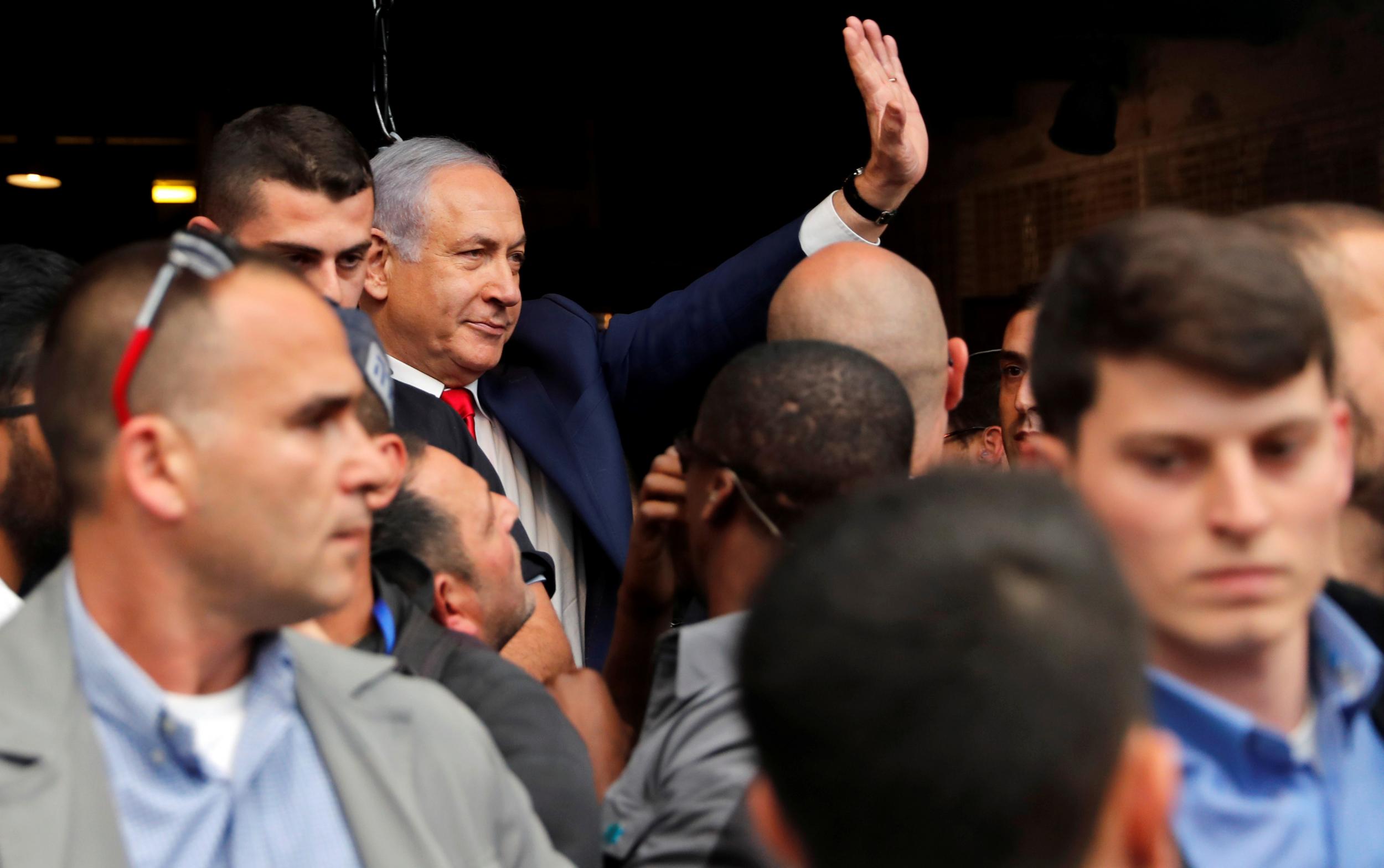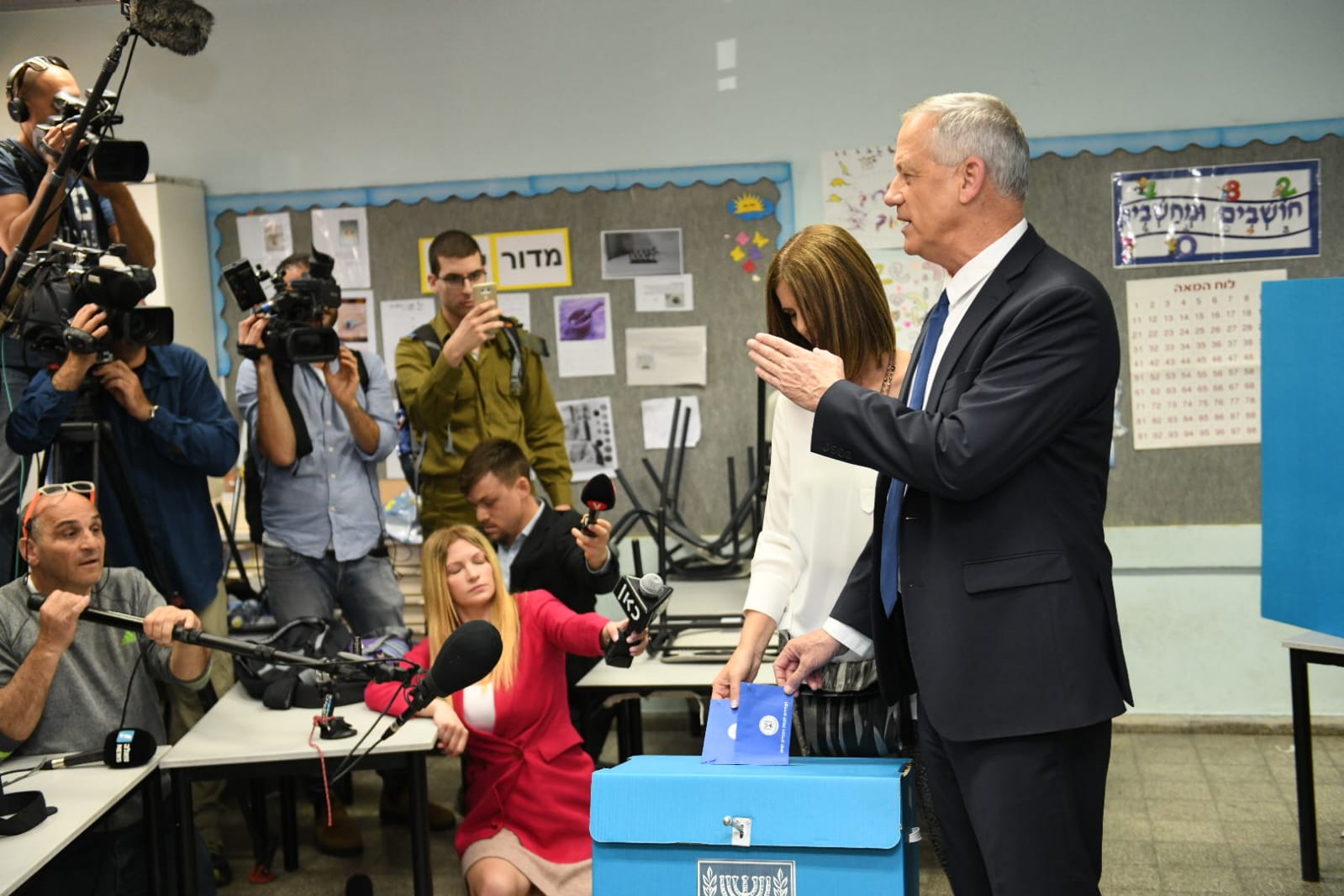Israel election: Netanyahu and Gantz neck-and-neck in final hours of voting
'We have had enough of Netanyahu but unfortunately we do not have another politician of such calibre to do the job,' says one voter
Your support helps us to tell the story
From reproductive rights to climate change to Big Tech, The Independent is on the ground when the story is developing. Whether it's investigating the financials of Elon Musk's pro-Trump PAC or producing our latest documentary, 'The A Word', which shines a light on the American women fighting for reproductive rights, we know how important it is to parse out the facts from the messaging.
At such a critical moment in US history, we need reporters on the ground. Your donation allows us to keep sending journalists to speak to both sides of the story.
The Independent is trusted by Americans across the entire political spectrum. And unlike many other quality news outlets, we choose not to lock Americans out of our reporting and analysis with paywalls. We believe quality journalism should be available to everyone, paid for by those who can afford it.
Your support makes all the difference.Israelis are voting in a knife-edge election that could secure Prime Minister Benjamin Netanyahu a record fifth term in office or see the country’s ex-army chief break the incumbent's decade-long grip on power.
Over 6 million registered voters are pitted to cast their ballot on Tuesday with exit polls due to be released around 10pm local time and final results expected around dawn on Wednesday.
Benny Gantz, former army chief of staff, and Mr Netanyahu, launched frantic last-minute bids to secure more votes in the polls which many see as a referendum on the premier’s hold on power.
Most of the final polls released on Friday gave Gantz’s Blue and White centrist alliance a one-seat edge over Mr Netanyahu’s right-wing Likud Party in the 120-seat Knesset with Labour Party trailing in a distant third.
But all predicted that a right bloc would sweep a victory from the centre-left, signalling Mr Netanyahu would more likely be tasked with forming the next government.
The voting was briefly blighted by media reports that Mr Netanyahu's right-wing Likud party had placed over 1,200 body cameras on its activists to observe Arab polling stations.
Police confiscated the illegal cameras, and Israel's Central Elections Committee chairman Judge Hanan Melcer reportedly filed a complaint to the Israel Police over the incident.
Mr Netanyahu was quoted by Haaretz as saying that cameras were needed everywhere in order to ensure a "kosher" voting process.
Battling over possibly a few thousand crucial votes, elections newcomer Lt. Gen. Gantz said "change is possible" as he cast his vote on Monday morning in central Israel, adding: "We will take this new path".
Mr Netanyahu, who has been dogged by possible indictment on corruption charges, said "with God's help the State of Israel will prevail" as he voted in Jerusalem.
The incumbent took to Twitter in the afternoon to state he was calling an emergency meeting with his campaign officials to discuss what he described as lower voter turnout in Likud strongholds compared with a strong voting percentage in "left-wing bastions". The remarks were reminiscent of comments during the last election day, in which he said Arab voters were heading to the polls in "droves" and urged his supporters to vote.
Earlier Mr Netanyahu played up recent wins with US President Donald Trump and controversially promised to annex the occupied West Bank, which is a far-right demand but illegal under international law.
"This is a choice between a strong right-wing government under Netanyahu or a weak leftist government under Gantz," the Likud Party said in a final statement.
If Mr Netanyahu wins the elections he will be longest-serving prime minister in Israel’s history, beating the country’s founding father David Ben-Gurion. He may also be the first Israeli premier to stand trial while still in office.
In February, the country’s attorney-general announced that he planned to indict Mr Netanyahu on corruption charge in three cases. The embattled leader will face a pre-trial hearing after the elections, before the final decision on his indictment will be made.
He also courted controversy by overseeing the merger of key coalition partner, the ultranationalist party Jewish Home with Jewish Power, an offshoot of the Kach movement, which was outlawed by Israel and the US because of its racist and extremist views.
Both issues have boosted the chances of political newcomer Lt. Gen Gantz, who led the country's army during the Gaza war in 2014 and has now formed a powerful coalition with opposition leader Yair Lapid and two former generals.
Lt. Gen Gantz has repeatedly said that change is needed. On Tuesday morning he told Reuters: "Netanyahu is not the messiah, nor an irreplaceable legend. The people of Israel long for something else."
At the polling stations in central Jerusalem, voters said that the elections did feel like a "referendum" on Mr Netanyahu, known by his childhood nickname Bibi. Although many were fed up with his 13-year rule they felt that there was no one qualified enough to properly challenge him.

“We have had enough of Netanyahu but unfortunately we do not have another politician of such calibre to do the job. He is almost majestic in the way he handles foreign affairs," said Sicha Yagl, 67, a professor of obstetrics and gynaecology who voted for the New Right, an ultranationalist right-wing party and key coalition partner for Mr Netanyahu.
"People do care about the corruption cases against him but people forgive him for this behaviour because there isn’t anyone else. Gantz doesn’t even compare," he added.
It was a different story in Pisgat Ze'ev, an Israeli settlement in East Jerusalem, and also the ultra orthodox neighbourhoods of Mea Shearim, where hardline supporters of the religious parties said they backed the incumbent premier, fearing a Gantz win would see softer policies towards the Palestinians but less tolerance for Orthodox demands.
“I’m voting for Shas but want Netanyahu to be my prime minister. He is the only one brave enough to speak up for the settlements, the only one with actual experience to can rule the country, “ said Yossi Shkalo 20 a religious student.
In Mea Shearim Ami Green, 35, who voted for Likud said: “13 years is not enough in power frankly, give us another 13.”
In Tel Aviv, Isreal's cultural and commerical capital, many voters placed their hope in Gantz, saying a fresh face was needed.
"We voted Blue and White because, first of all, let's start with anything but Bibi,” said Lilach Nasini, who came to vote with her husband Itay Geffen. They both expressed concerns about the premier’s involvement with extremist group Jewish Power, and the corruption cases against him.
“We need to provide hope for the next generation, which doesn't anymore believe in our leadership. We want to leave [Israel] because we feel like the country has just been lost. The politicians are corrupt," she added.
Avi Barshavsky, 67 taxi driver, also a blue and White supporter, said little had been achieved in Netanyahu's last decade of rule, including dealing with soaring living costs and the worsening security situation.
“After 13 years, he hasn’t done anything. He just knows how to take the microphone and to speak,” Mr Barshavsky said.
“These extremists [Jewish Power] will do nothing but destruction," he added.
Late on Monday, Mr Netanyahu reminded the electorate of his recent successes with Mr Trump. On Twitter, Mr Netanyahu thanked the American president for designating the Iranian Revolutionary Guards as a terror organisation, claiming Trump’s surprise decision on Monday was a “response” to one of his requests.
It came just weeks after Mr Trump controversially signed a declaration recognising Israeli sovereignty over the occupied Golan Heights, which Israel seized from Syria in the late 1960s: one of Israel’s key demands.
"Who else can do this? Who can do this? Come on. Honestly," Mr Netanyahu said on Monday.

The elections may also be blighted by a large boycott from Israel’s 1.9 million Arab citizens, who make up around 20 per cent of the population.
Mr Netanyahu’s announcement he would annex the West Bank and earlier decision to push through a controversial Nation State Law, branded by critics as racist, upset much of the country’s non-Jewish citizens.
The constitution-like legislation downgraded Arabic from an official state language, promoted the creation of Jewish-only settlements and defined national self-determination as “the unique right of the Jewish people”, angering many.
At polling stations in Sheikh Jarrah, East Jerusalem, Arab voters said they feared a Netanyahu win was inevitable and another term in office would only embolden him and the far right to further crackdown on the Arab population.
"We have no real equality in the state, and his win will only mean the government will become more extreme and we will face more discrimination. Now they are very blunt about wanting to kick us out," said Rajaa Tabar, 53, a programmer from Beit Hanina who was voting for an Arab party. He said his wife, who is from Bethlehem in the occupied West Bank, had not been able to secure an Israeli ID card despite 20 years of marriage and so her movement is restricted as a Palestinian.
"No democracy in the world treats a portion of its citizens like this," he added.
Shada Mohamed, 25, a lawyer, said that Gantz as prime minister would be no better.
"Both are bad, you're choosing from the worst of all worlds," she said.

Join our commenting forum
Join thought-provoking conversations, follow other Independent readers and see their replies
Comments